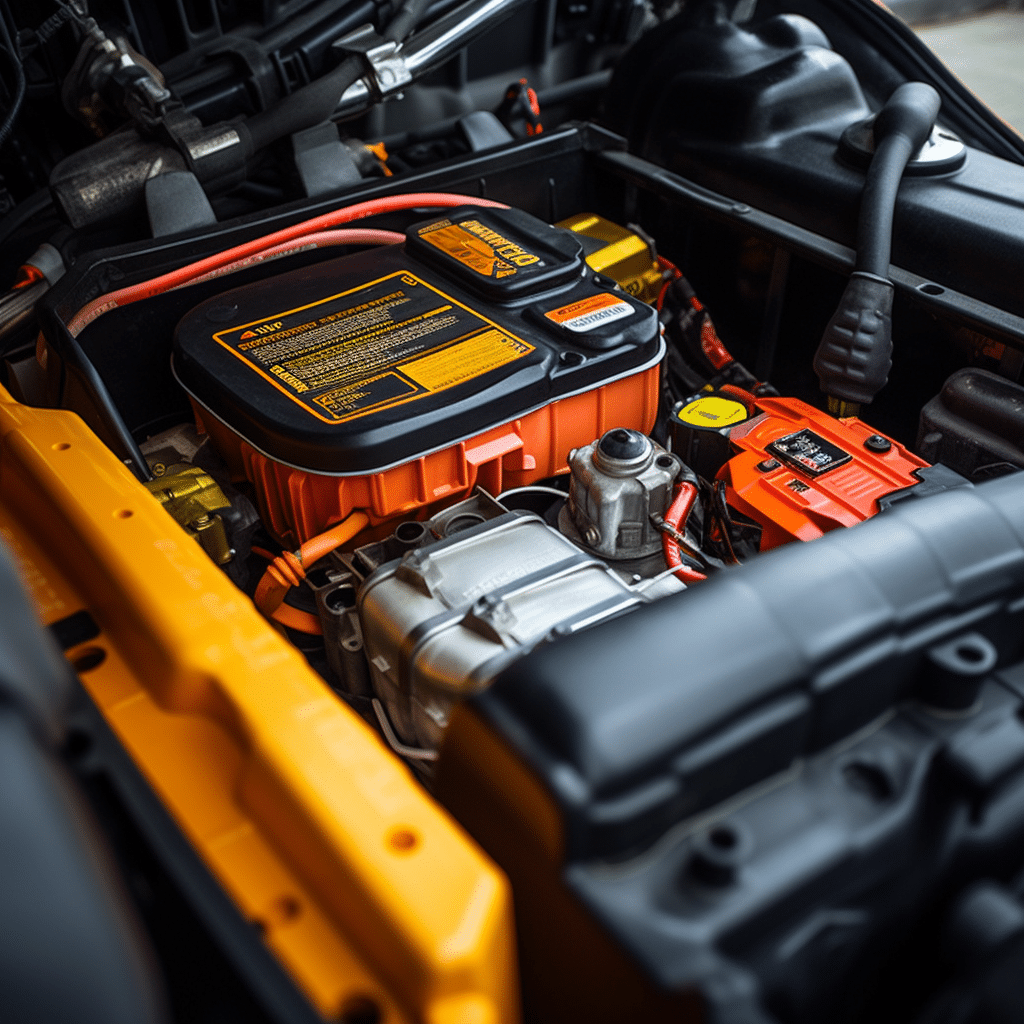
Mastering Car Battery Selection: Tips for Optimal Performance
Compatibility is key. Batteries are not all the same, so it’s essential to find the right size and type for your vehicle. Checking the owner’s manual or consulting a professional can help.
Battery lifespan is also important. Some have longer life expectancies than others, saving you time and money in the long run.
Pay attention to cold-cranking amps (CCA). This tells you how well a battery performs in cold weather. If you live in a cold area, a battery with a high CCA rating is important.
Maintenance requirements also vary. Traditional lead-acid batteries need regular checks and distilled water, whereas sealed/maintenance-free batteries don’t.
Lastly, budget matters. It may be tempting to go for the cheapest option, but a higher-quality battery from a reputable brand can offer better performance and longevity.
Understanding the importance of a car battery

A car battery is essential for the car to start and run its electric components. Neglecting the battery can lead to car breakdowns and costly repairs. To keep your car running smoothly, it’s important to understand the importance of a well-maintained battery.
A healthy battery powers the engine, lights, air conditioning, and entertainment systems. It also stores energy from the alternator to provide power when needed. The performance and life of your vehicle depend upon the battery.
Here are some tips to maintain your battery:
- Maintenance: Check for corrosion or damage, clean connections, and tighten them for efficient current flow.
- Reduce idle time: Long idling uses energy without recharging.
- Combine errands: Take one trip instead of multiple short ones to reduce strain and promote charging.
- Disconnect accessories: Unused chargers or dash cams drain power even if switched off.
Follow these tips to keep your battery healthy and avoid disruptions. Keeping your battery in good condition is vital for a reliable and efficient driving experience.
Factors to consider when choosing a car battery
When picking a car battery, there are multiple things to look at that can influence its performance and durability. These include size, type, brand, and warranty.
- Size: Make sure the battery fits in your car’s battery tray. Check your vehicle’s owner’s manual or consult a specialist to get the right size.
- Type: There are lead-acid and lithium-ion batteries. Think about your car’s needs and talk to an expert to pick the right type.
- Brand: Choose well-known brands for the battery. They usually have better quality control, so they’re more reliable.
- Warranty: Get batteries with a good warranty. In case of any issues or defects, it can save you money.
Plus, other details are important too. This includes factors like the climate you live in, as weather can affect the battery. Also, think about your driving habits and your vehicle’s electrical needs to get the correct ampere-hour rating. Pro Tip: Check your battery’s condition regularly and keep it clean to get better performance and longer life.
Steps to choose the right car battery
Choosing the right car battery is vital to ensure your vehicle’s performance and dependability. Use these easy steps to make an informed decision.
- Step 1: Determine the Battery Size. Check your car’s manual or ask a professional to discover the right battery size for your vehicle. This size is generally indicated with a series of numbers and letters. It’s very important to select a battery that fits perfectly in your car’s battery compartment.
- Step 2: Consider the Battery Type. Different types of car batteries are available in the market, such as lead-acid, AGM (absorbent glass mat), and lithium-ion batteries. Each type has its pros and cons. Think about factors like budget, performance requirements, and environmental conditions to pick the most suitable battery type for your needs.
- Step 3: Check the Cold Cranking Amps (CCA). The CCA rating shows a battery’s capability to start an engine in cold temperatures. It measures how much power the battery can deliver for 30 seconds at 0°F (-18°C) while keeping a voltage of at least 7.2 volts. Confirm that the CCA rating meets or is better than your vehicle manufacturer’s specifications.
Also, remember regular maintenance and proper handling of the battery are necessary for its life and optimal performance.
Did you know? A study by Consumer Reports says car batteries usually last three to five years before needing replacement.
Tips for proper car battery maintenance

Maintain your car battery correctly to keep it efficient and long-lasting! Here are some tips:
- Inspect and clean the terminals often to prevent corrosion.
- Don’t overcharge or undercharge.
- Check electrolyte levels and add distilled water when needed.
- Switch off all electrical components when the engine is off.
- Park the car in a cool, dry place.
- Use a trickle charger or disconnect the battery if you won’t be using the car for a while.
Plus, look out for any signs of damage or wear on the battery casing. Test the electrical system regularly too. Consumer Reports says car batteries last 3-5 years. Follow these steps to get the most out of your battery’s life!
Conclusion
In the end, selecting the ideal car battery requires careful deliberation. Comprehending battery type, capacity, and brand trustworthiness is indispensable. Doing this will guarantee ideal performance and longevity for your vehicle.
First off, battery type is an urgent factor in deciding its appropriateness for your car. Knowing the pros and cons of both lead-acid and lithium-ion batteries is imperative. Take into account factors like cost, maintenance needs, and environmental effect to make a wise decision.
Capacity is an additional important element to think about. It means the amount of charge a battery can store and deliver constantly over time. Analyzing your vehicle’s power needs is fundamental in understanding the ideal capacity required. This ensures your car has enough power for all its electrical systems without overloading or underutilizing the battery.
Besides these factors, brand reliability cannot be ignored. Picking a respected and trusted brand guarantees that you invest in a quality product that has gone through intense testing and meets industry standards. Examining consumer reviews and seeking expert advice can be helpful resources in making an educated choice.
When we look into the past, car batteries have progressed significantly in terms of technology. From early lead-acid batteries to current lithium-ion ones, improvements have increased both performance and durability with time. This evolution has enabled vehicles to run more effectively while decreasing their environmental impact.
By bearing in mind these various components – battery type, capacity, and brand reliability – you can confidently pick the right car battery for your requirements. Remember that purchasing a high-quality battery will not only provide long-term benefits but also contribute to a smoother driving experience overall.
Frequently Asked Questions
1. What factors should I consider when choosing a car battery?
When choosing a car battery, consider factors such as the battery size, type, and brand, as well as your car’s power requirements. It’s important to ensure that the battery is compatible with your vehicle.
2. How do I determine the correct battery size for my car?
You can determine the correct battery size for your car by consulting your vehicle’s owner’s manual or checking the current battery’s specifications. The battery size is usually indicated by a group number, which corresponds to the dimensions and terminal placement.
3. What types of car batteries are available?
The most common types of car batteries are lead-acid batteries, which include flooded, gel, and absorbed glass mat (AGM) batteries. Each type has its own advantages and disadvantages, so choose one that suits your driving needs and budget.
4. How long does a car battery typically last?
The lifespan of a car battery can vary depending on several factors such as climate, driving habits, and battery quality. On average, a car battery can last between 3 to 5 years. Regular maintenance and proper usage can help extend its lifespan.
5. Can I replace my car battery myself?
Replacing a car battery can be done as a DIY project if you have the necessary tools and knowledge. However, if you’re unsure or uncomfortable with the process, it’s recommended to seek professional assistance to ensure proper installation.
6. Are there any warranties for car batteries?
Yes, most car batteries come with warranties that cover a specific period. The warranty terms may vary depending on the brand and type of battery. It’s important to read and understand the warranty details to know what is covered and for how long.
